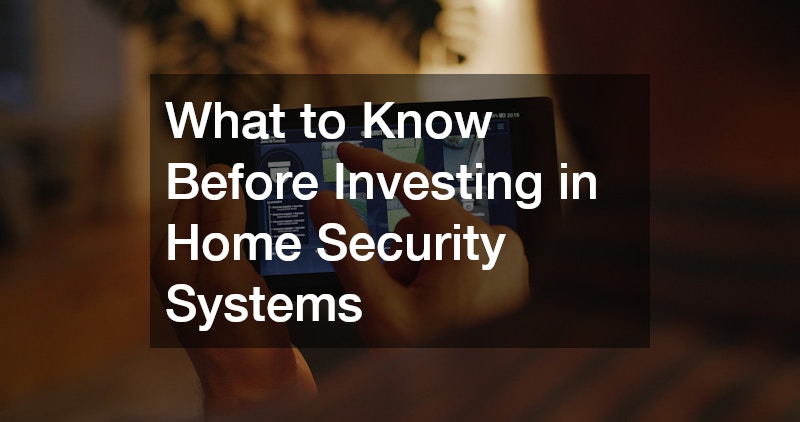

Investing in home security systems is more than a financial decision; it’s about ensuring the safety and peace of mind for you and your family. With the rise in home burglaries and thefts, having a robust security system is no longer a luxury but a necessity. Statistics show that homes without security systems are up to 300% more likely to be broken into compared to homes with one, highlighting their protective value.
These systems deter unauthorized access and serve as a constant watch over your most cherished belongings, providing a comprehensive layer of safety. Besides protecting against intrusions, modern systems also deliver critical features like fire alarms and flood detection, addressing a broad spectrum of emergencies.
The psychological comfort provided by home security systems cannot be understated. Knowing that your home is monitored 24/7 creates a strong sense of security and reduces anxiety, especially when you’re away. Many homeowners report sleeping better at night and enjoying vacations more when they know their home is secured by an advanced system. In addition to tangible benefits, the reputable presence of a security system in your neighborhood can raise the overall property values and foster a stronger sense of community safety. Together, these elements emphasize why investing in home security yields returns that extend beyond traditional financial metrics.
Home security systems also contribute to more than just individual home safety; they bolster community well-being. Systems with interconnectivity features enable neighbors to support each other by sharing alerts about potential threats in the vicinity. Additionally, these systems often integrate with community policing efforts, assisting local law enforcement in responding more effectively to incidents. In a broader sense, security technology is evolving, benefiting areas like crime investigation, helping to resolve incidents faster. By investing in a home security system, you’re not just safeguarding your home but are also playing a role in enhancing the safety infrastructure of your entire community.
Types of Home Security Systems
Homeowners face a variety of choices when selecting a home security system, with options ranging from basic setups to high-tech installations. Choosing the right type depends largely on individual needs and home specifics — whether you’re looking for simple burglar alarms or comprehensive smart systems with camera integrations. Basic security setups might include window sensors and alarm systems, ideal for smaller households or renters seeking minimal yet effective protection. Intermediate systems often incorporate cameras and motion detectors that provide real-time monitoring and alerts. At the top end, smart security systems offer integration with home automation for robust control over lighting, locks, and even thermostats alongside their security features.
The choice between wired and wireless systems is another important consideration in setting up home security. Wired systems offer reliability and are less susceptible to interference, making them a strong choice for homeowners who plan to stay long-term. However, they require professional installation and are less flexible to reconfigure if you decide to move or expand. Wireless systems, on the other hand, offer easy installation and the flexibility needed for those who might move homes more frequently. Despite their convenience, wireless systems require a strong internet connection to ensure consistent performance and may face interference from other household devices.
Modern home security systems also come with the option of monitored or unmonitored setups. Monitored systems involve a monthly fee for professional surveillance around the clock, ensuring immediate response to any alerts triggered by the system. This choice is suitable for those who value quick emergency responses and professional assistance. Unmonitored systems, while reducing ongoing costs, place the responsibility of monitoring on the homeowner or selected emergency contacts, relying on notifications sent to devices via apps. This option can be economic and sufficient for those who prefer self-reliance or have reliable personal networks to lean on in emergencies.
Cost Considerations
Budget plays a critical role in determining the type of home security system suitable for you, and costs can vary significantly based on the complexity and features of the chosen system. Basic systems begin at a few hundred dollars, often encompassing fundamental components like alarms and door sensors. As features increase in both number and sophistication, so does the price, with advanced smart systems venturing into thousands. It’s essential to weigh upfront costs versus long-term benefits — while pricier systems provide higher security and convenience, the investment might feel burdensome without precise planning. Additionally, ongoing costs such as maintenance, monitoring, and potential upgrades should be factored into your budgetary decisions.
Hidden costs are another aspect to be mindful of when budgeting for home security systems. Installation can add substantial expense, particularly for wired systems requiring professional setup. Monthly monitoring fees are additional ongoing costs, which vary widely depending on the service package selected. Furthermore, device maintenance and battery replacement necessitate occasional spending to ensure the system’s continued efficiency and reliability. Balancing these hidden costs against the overall enhancement of security and peace of mind is an essential step in making an informed purchase decision.
The economic benefit of lowering home insurance premiums can help offset some costs associated with installing a home security system. Many insurance providers offer significant discounts for homes equipped with security systems, recognizing the reduced risk of loss they provide. This financial incentive, juxtaposed with the value of safeguarding your home, reinforces the practicality of investing in such systems. By taking the step to protect your home with advanced security features, you’re not only enhancing your own safety but potentially saving money in the long run. These combined savings illustrate the multifaceted financial considerations that come with purchasing home security systems.
As you navigate this decision, remember that investing in a home security system is an investment in the safety and serenity of your home environment. The market offers solutions for every budget and demand, making an effective system within reach for many. Evaluate your options meticulously, taking into account both current security needs and future home automation aspirations. By aligning your choice with these long-term objectives, you’ll secure the rewards of peace of mind and effective protection against unforeseen dangers. Your home is more than just a property; it’s your haven, deserving of the best protection you can afford.




